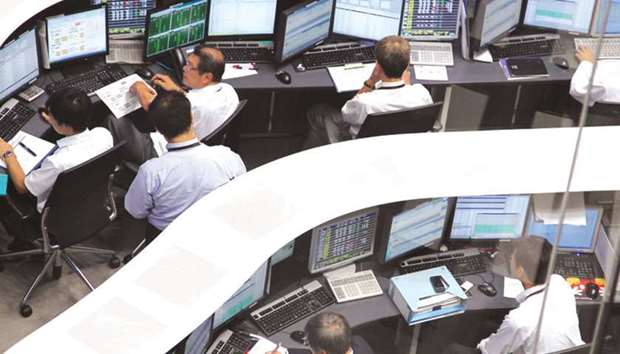Asian equities extended a relief rally into a second day yesterday as traders were emboldened by a receding risk of clashes between the United States and North Korea, with safe haven assets continuing to lose ground.
Most major regional indices were glowing green, with prices jumpstarted by a strong performance on Wall Street and further fuelled after Pyongyang appeared to put on ice its plan to launch missiles near Guam.
Markets also breathed a sigh of relief as senior US figures dialled down tensions, after a war of words last week had sparked global alarm.
Tokyo powered more than 1% higher, with the weakening yen providing an extra boost to the Nikkei which had closed at its lowest level for more than three months on Monday.
Shanghai and Sydney also closed up, although Hong Kong gave up gains in late trade to finish lower.
Seoul was closed for a public holiday.
“Tensions between the US and North Korea seemed to cool a little — at least on the US side — and that emboldened the bulls to buy stocks once again,” said Greg McKenna, an analyst at AxiTrader.
Asian investors also appeared to take in their stride rising trade tensions between China and the US as Beijing warned that it “will not sit idle” if a US probe into its intellectual property practices leads to sanctions. US stocks were solidly higher Monday, with the S&P 500 advancing 1%.
The dollar moved off recent lows after New York Federal Reserve Bank president William Dudley indicated another interest rate increase this year was likely and suggested the central bank would reveal plans to reduce its balance sheet next month.
On forex markets on Monday, the greenback was trading at about ¥110.3, after falling to eight-week lows under ¥109 as investors fled to safe haven assets at the height of the crisis last week.
The US currency also rose against the euro and the pound as calm returned to markets and geopolitical tensions eased, with European stocks also gaining ground in opening trade yesterday.
US Defence Secretary Jim Mattis and Secretary of State Rex Tillerson wrote in The Wall Street Journal that America has “no interest” in regime change in Pyongyang, and stressed the importance of a diplomatic solution to the crisis.
And North Korean leader Kim Jong-un hinted yesterday he would hold off on the plan to test-fire missiles towards the US Pacific island territory of Guam, saying he would “watch a little more the foolish and stupid conduct of the Yankees”. South Korean President Moon Jae-in also weighed in, saying Seoul would avoid a second Korean War at all costs.
On commodities markets, classic safe haven asset gold was trading at about $1,275 an ounce, down from $1,292 reached last Friday.
US crude remained well below $48 a barrel after slumping Monday on fears of falling oil demand in China.
“Last night it seems traders grasped the news of Chinese refinery runs hitting a 10-month low and sold hard,” McKenna noted.
The stronger dollar and relatively weak industrial output data from China Monday also weighed on prices.
Traders were awaiting US commercial crude inventory numbers from industry group American Petroleum Institute and the US Department of Energy today.
In Tokyo, the Nikkei 225 closed up 1.1% at 19,753.31 points; Hong Kong — Hang Seng fell 0.3% at 27,174.96 points and Shanghai — Composite ended up 0.4% at 3,251.26 points yesterday.

Employees work at the Tokyo Stock Exchange. The Nikkei 225 closed up 1.1% to 19,753.31 points yesterday.
